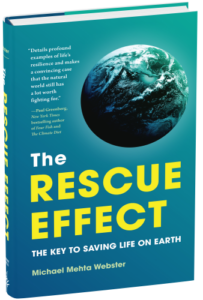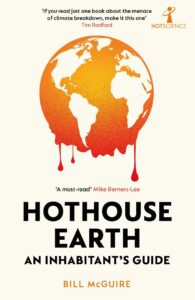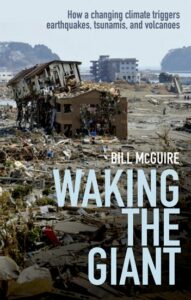Zoologist Michael Mehta Webster with cautious hope in his new book “The Rescue Effect: The Key to Saving Life on Earth”. Dr. Bill McGuire has a darker view. He talked about his new work “Hothouse Earth: An Inhabitant’s Guide” with Alison Green from the group Scientists’ Warning.
Listen to or download this Radio Ecoshock show in CD Quality (57 MB) or Lo-Fi (14 MB)
Welcome to Radio Ecoshock. I’m Alex Smith. Before we get to our interviews, let’s cover a couple of minutes of news and breaking science that should be mainstream headlines, but never made it through the noise.
THE WEATHERMEN
Large conservative organizations are finally sounding the alarm about climate disaster. Just a decade or two ago, Meteorologists still debated climate change. Most television meteorologists refused to say the words “climate change” – or were outright deniers. That was then. Here are a few paragraphs from a press release in Geneva September 13, 2022 from the World Meteorological Organization.
“Geneva, 13 September 2022 (WMO) – Climate science is clear: we are heading in the wrong direction, according to a new multi-agency report coordinated by the World Meteorological Organization (WMO), which highlights the huge gap between aspirations and reality. Without much more ambitious action, the physical and socioeconomic impacts of climate change will be increasingly devastating, it warns.
The report, United in Science, shows that greenhouse gas concentrations continue to rise to record highs. Fossil fuel emission rates are now above pre-pandemic levels after a temporary drop due to lockdowns. The ambition of emissions reduction pledges for 2030 needs to be seven times higher to be in line with the 1.5 °C goal of the Paris Agreement
The past seven years were the warmest on record. There is a 48% chance that, during at least one year in the next 5 years, the annual mean temperature will temporarily be 1.5°C higher than 1850-1900 average. As global warming increases, “tipping points” in the climate system can not be ruled out.
Cities that host billions of people and are responsible for up to 70% of human-caused emissions will face increasing socio-economic impacts. The most vulnerable populations will suffer most, says the report which gives examples of extreme weather in different parts of the world this year.
“Floods, droughts, heatwaves, extreme storms and wildfires are going from bad to worse, breaking records with alarming frequency. Heatwaves in Europe. Colossal floods in Pakistan. Prolonged and severe droughts in China, the Horn of Africa and the United States. There is nothing natural about the new scale of these disasters. They are the price of humanity’s fossil fuel addiction,” said UN Secretary-General António Guterres.
“This year’s United in Science report shows climate impacts heading into uncharted territory of destruction. Yet each year we double-down on this fossil fuel addiction, even as the symptoms get rapidly worse,” Mr Guterres said…”
ACIDIFICATION OF THE ARCTIC OCEAN
Climate change rears up in unexpected ways and places. A new study, published September 29, finds the waters of the Western Arctic Ocean are getting more acidic – “at a rate three to four times higher than in other ocean basins. They suggest this increase has been driven by the rapid loss of sea ice in the region, which has exposed carbon dioxide-poor waters to the atmosphere where they can absorb more CO2. “ [quoting a press release about the paper from Science.]
Suddenly more acidic waters make it hard for any creature that needs calcium to make shells, like Alaska crab, but even harder for the tiny shelled plankton at the base of the food chain. By the way there will not be a Snow Crab harvest in Alaska this year. At least of a billion of them have disappeared. This was a huge commercial catch loved by many.
GOING BACK TO THE FAMILIAR IN A CRISIS
So many people, millions of them, badly want to return to the past. They see the old days through golden spectacles – and anyway it must be better than a future in climate Hell, a disintegrating economy, and ongoing pandemic. Climate activists fight this every day. Now the American Psychological Association has proved it in a study released October 6. Ponder this, from the APA press release:
“When people believe that a door is closing — that they have a limited amount of time left to enjoy something, such as dining out or traveling — they gravitate to the comfort of something familiar rather than the excitement of something new, according to research published by the American Psychological Association.
In eight experiments with nearly 6,000 total participants, researchers explored whether people tend to prefer novel, exciting experiences, such as trying a new restaurant, or familiar ones, such as returning to an old favorite — and whether those preferences shift with the amount of time people believe that they have left to enjoy similar experiences.
The research was published in the Journal of Personality and Social Psychology.”
So as climate change becomes more threatening, people you know will head out to buy gas-guzzling vehicles and family fly-in in Fiji. They want to act out the past, to ward off a future too threatening to think about. Sound familiar?
KILLER COAL UPDATE
In January 2019, I interviewed the well-known German environmentalist Heffa Schueking, Director of the group Urgewald. The show was called “Halting Mass Suicide by Coal”.
On October 6, 2022 the group released it’s latest report on global coal mining. They found, quoting from CNBC: “Nearly half of the coal industry is still on an expansion course in ‘reckless’ mining rush…An annual update from Urgewald and 40 partner NGOs found that 46% of companies on its Global Coal Exit List were pursuing new coal power plants, coal mines or new coal transport infrastructure.”
“Richard Brooks, Stand.earth Climate Finance Director issued the following statement:
“As communities experiences climate chaos like fires, floods, and deadly heat, it’s blasphemous financial institutions like Royal Bank of Canada, Citibank, and major public pensions continue to bankroll coal. Ahead of COP27, this report reveals the dangerous greenwashing of companies touting net-zero pledges on one hand, while bankrolling climate destruction on the other.”
Heffa Schuecking said:
“Out of the 1,064 companies in our database, 490 are developing new coal power plants, new coal mines, or new coal transport infrastructure. Pursuing new coal projects in the midst of a climate emergency is reckless, irresponsible behavior. Investors, banks, and insurers should ban these coal developers from their portfolios immediately,”
If you have a pension, mutual funds, or any investments call your bank or agent and find out if coal is part of their portfolio. Complain and move those funds if you can, and never stop fighting it. Coal burning is the single largest source of damaging greenhouse gases on the planet.
If we don’t quit coal now, our life support system will be toast within this century. Of course life on Earth will continue in the coming Greenhouse world, just maybe not us. Nature has evolved ways for other creatures to survive shifts in climate. And though tens of thousands of creatures are on the brink of extinction, most living things will keep going, according to our next guest on Radio Ecoshock.
===================================
My thanks to everyone who has supported this difficult work of broadcasting. I report for you, and for everyone who will lend an ear. If you can afford to help Radio Ecoshock continue, please check out this page. For simplicity of book keeping (and tax reports) I use PayPal, despite doubts about the views of some company founders. Otherwise I would have to hire part-time office help, and there is no budget for that. If you prefer, I also put a mailing address on that support page, where you can send a check made out to “Ecoshock”. It must say Ecoshock on the check. Radio Ecoshock has become a listener-supported program – offered free to 106 non-profit radio stations every week, podcast, and downloadable free, and free of advertising. Thank you for your help!
====================================
MICHAEL MEHTA WEBSTER “THE RESCUE EFFECT”
Do you have a mental block on hearing about hope these days? Living without hope is called “despair”. That would be understandable in these days of war, pandemic, inflation, extreme weather and disappearing nature. I struggle to find joy myself. But should we automatically tune out when any hope is offered?
Psychologists suggest the brain developed to record bad experiences – in order to avoid them next time. We make indelible records of a car crash or the death of a loved one. But there is no need for the brain to make strong memories for just another gorgeous day. Maybe our mental machinery has evolved to watch for negative news. As a broadcaster, I can attest the old nightly news slogan: “If it bleeds, it leads”. The first news story is usually about horror. We all gravitate toward hearing about that. Now instant media communications feeds a loop where everything appears to be dying.
Take the ongoing stories about mass extinction. They are terrifying. But as Michael Mehta Webster tells us, nature is not dying now, not by a long shot. The number of species known to be extinct are less than one percent of all the teaming life on this planet. Michael is an experienced Zoologist – he knows. We talk about his new book “The Rescue Effect: The Key to Saving Life on Earth”.

It makes sense living things have built up adaptation to extreme climate shifts. The Earth has seen a lot of swings from “icehouse Earth” to “hothouse Earth”. Life forms that could not adapt are no longer with us.
When I was offered a book on how nature might have helpful responses to climate change, I thought: “Oh boy, another book of “hopium” while the planet goes catastrophic”. On the other hand, we all need reasons to keep going and avoid crippling outright Depression. But this book is not positive sugar at all. Michael does find ways the natural world can respond in ways to protect itself, but also includes the doubts, critics, and limits. It is an honest book after all.
Listen to or download this 27 minute interview with Michael Mehta Webster in CD Quality or Lo-Fi
We find a handy summary of Webster’s “rescue effects” in the Press Release for the book:
“In The Rescue Effect, Webster reveals that the natural world has a series of systems—rescue effects—that automatically activate to help organisms when their environment changes, “like a thermostat turning the air conditioning on when a room gets too warm, the rescue effect automatically turns on when a population is stressed or declining.” Through these systems, nature can independently save endangered species from extinction. These rescue effects are revealed in compelling stories of species that are adapting to the changing world—including tigers in the jungles of India, cichlid fish in the great rift lakes of Africa, and mountain pygmy-possums in the snowy mountaintops of southeastern Australia.
The Six Rescue Effects
Demographic Rescue: When new individuals immigrate to a small population of organisms to provide a numerical boost that prevents them from going extinct.
Reproductive Rescue: When the reproduction and survival rates of the group of organisms increase in uncrowded conditions, which increases the population size.
Genetic Rescue: When immigrants bring new genetic diversity to a small population, helping it overcome genetic disorders.
Phenotypic Rescue: When an organism adjusts its physiology, outward appearance, or behavior to cope successfully with changing environmental conditions.
[Alex thinks: is this what humans are doing now, with changes in clothing, air-conditioning, more jobs indoors, automating outdoor work… will we modify our physiology as well?]
Geographic Rescue: When a species successfully relocates to a new geographic location after environmental changes render its old location unsuitable.
Evolutionary Rescue: When organisms evolve, through survival of the fittest, to be able to persist under newly stressful conditions.
This does not mean humans can be passive. At the center of each story, people play a significant role—they must work in concert with nature to reverse climate change and save our planet.”
Of course I hoped to skim the book quickly, but got sucked into reading the whole thing by Michael’s stories about the living world. For example, he begins “Rescue Effect” with the case of the big cats: wild tigers. How is it possible that every single tiger in an Indian Government Tiger Reserve was killed? We talk about all that, and whether there will be tigers anywhere outside of storybooks and zoos when our kids have their kids.
From the book “Rescue Effect”:
“As a result of habitat loss and poaching, the global wild tiger population has crashed, from around 100,000 animals in 1900, to about 4500 in 2008 – a decline of about 95 percent during that time. Most of the holdouts are Bengal tigers in India, like Panna Lal, which number around 3000; the rest persist in small pockets of tiger habitat across Indonesia, Southeast Asia, and Russia.”
Michael was a scientist and leader with the Coral Reef Alliance – an environmental non-profit, non-governmental organization based in Oakland, California that is dedicated to coral reef conservation. So we talk about hopes and fears for the big reefs, like Great Barrier in Australia. But coral all over the world is important. A quick quote from “The Rescue Effect”:
“Our oceans cover three-quarters of the Earth, and although coral reefs occur in only a tiny fraction of this expanse – less than 1 percent of the ocean floor – this sliver of habitat is crammed with roughly 25 percent of all ocean species.”
In our interview, Michael explains that does not mean 25 percent of all ocean species would go extinct if coral disappeared. Some of those species can find other habitats. Others will not, and would pass away with their coral homes.
A few years ago I interviewed top coral expert Charles Veron. Charlie spent a lifetime literally writing the encyclopedia of coral types, only to see many die off in that same lifetime. He was very sad about it. Michael Webster is super concerned about threat to coral, but cautions now all coral is endanger (yet) and some reefs can rebound from marine heat waves and bleaching. It is bad for coral, but not The End! Scientific study suggests most coral CAN adapt to rising temperatures (if not too rapid change). The harder part may be surviving sea level rise.
In 2017, I interviewed Pankaj Khanna from Rice University, Texas. His team found plateau steps of dead coral reefs in the Gulf of Mexico off Texas. Each had died in a relatively fast amount of rising sea. The coral “drowns” so to speak, as the water above it gets too deep to allow enough sunlight to reach plants needed for coral animals to feed. Those symbiotic algae plants give coral its colors. Without light, the food dies, and so does the coral. So, sea level rise is the bigger threat! (And by the way, as the title of that show warns…)
One of our Ecoshock guests reminded us present day coral did not build the largest structures in the Great Barrier Reef around Australia. Those corals died out and went extinct, likely due to a climate shift. But after a long time, a new type of coral animal appeared to begin anew.
Part of Michael’s argument: we need to investigate these six types of natural rescue, to (a) make sure we are not inhibiting any of them and (b) to see if there are opportunities for humans to help nature heal itself. We can’t do that if we focus entirely on arriving Doom. At least that is what I get out of the book.
RETURN OF THAT OLD CHESTNUT?
Along the lines of human participation in Earth Rescue, Michael tells us about the journey of the American Chestnut tree. As we learn in the book, these great trees were the pride of American cities, provided edible nuts and lumber, covering whole valleys on the eastern side of North America. Around 1905 a disease from Asian Chestnuts found them, and not a single American Chestnut survived to develop a defense for the disease. The forests, the excellent wood, the forest jobs, they all disappeared.
Efforts to hybridize American Chestnuts (which continued to spring up from the roots) and the Asian varieties failed to find a disease-resistant variety. More recently, a fungal resistant gene from wheat was inserted into an American Chestnut. The resulting geoengineered trees appear to be resistant enough. A group of fans like The American Chestnut Foundation hope to replant it – if such a “geoengineered” plant can get approval. Anne Petermann from the Global Justice Ecology Project is against allowing transgenic trees like this Chestnut. Could the Chestnut come back to North America?
And if we go that route, what about “de-extinction” – like bringing back the Woolly Mammoth from DNA? Webster has doubts about that. And would that be a priority for research and funding, as living Tigers fade off the planet?
A key question is how much the rescue effects belongs to other species, and how much to humans? Humans may experience “Geographic Rescue” when hundreds of millions of people withdraw from the sea or other newly uninhabitable places. It doesn’t look like there will be time for evolutionary rescue for us, unless of course we master our own evolution…
THE CHOICES
Given our failure to stop climate-wrecking emissions, when it comes to the species we drive to extinction, we have two choices:
1. sit back and watch them disappear (being careful to capture them digitally first) or
2. think through unpleasant options that might save select species, because we love them, or because they are (like the corals) fundamental to life as we know it.
This book makes us seriously think about option number two.
IT’S ALL OK, EVERYTHING CHANGES ANYWAY…?
Only toward the final conclusion of the book do I find myself disagreeing with Michael Webster. To love the new reality is almost like that classic movie title “How I Stopped Worrying and Learned to Love the Bomb” (Dr. Strangelove). Maybe it is just weak human emotion, but yes, I mourn fabulous creatures that disappear. I am not thrilled with some of the new-comers, like the bright-colored Clown Fish that decimated Caribbean reef life. Yes, I mourn for the First Growth forest giants when they are cut down, or burned down by climate heat. I know Michael does too.
Here is part of what Michael writes:
“The truth is, ecosystems never arrive at some sort of stable equilibrium and then remain there….The next phase of life on Earth will be characterized by more waves of novelty as people drive species to new places and the environmental conditions that govern ecosystems shift because of climate change and other human activities.
People get to decide for themselves how to view this novelty. One option, which author Fred Pearce calls “green xenophobia,” is to revile new species and novel ecosystems, while valuing only the familiar species and ecosystems of the past. But perhaps green xenophobia is the result of clouded judgement, which causes us to devalue novelty unreasonably.
As an alternative, people can choose to recognize the value of novelty, which highlights the ability of species to adapt to new conditions and reorganize into something new, all the while providing services to people and wildlife.”
This is where you get to read about it, think it over, and decide. None of that detracts from Michael’s important contribution: nature has tools to rebound and maybe humans can (carefully, respectfully) help. We should all learn what those tools are.
“All the World is Suffering, therefore rejoice.”
– The Buddha

==========================================================
SCIENTISTS’ WARNING: ALISON GREEN WITH DR. BILL MCGUIRE
“Dr. Alison Green discusses the 1.5C controversy and ongoing climate emergency with Professor Bill McGuire, author and professor emeritus of geophysical and climate hazards at University College London.”
Watch it all on YouTube here:
Listen to or download this 24 minute interview of Bill McGuire by Alison Green in CD Quality or Lo-Fi
In my foggy understanding, Scientists’ Warning was begun as an online TV program by the late Stuart Scott. It became an organization, which is now headed by Alison Green in the UK. As the group’s web site tells us “Based in Cambridge in the UK, [Alison] is a cognitive psychologist and former university Pro Vice-Chancellor.” In a sense, Green left a plush job in academia to become a climate activist and communicator.
Bill McGuire is well known in the UK, and around the world. He is a vulcanologist by trade (specialist in volcanoes). He roused the world by suggesting big changes in gravity could stimulate more instability in the Earth’s crust, like volcanoes and earthquakes. When miles deep heavy ice melts off Greenland that could do it. In addition to gravity changes in Greenland itself, all that weighty water goes around the world as rising seas. Could rising sea levels find weaknesses in Earth’s crust, or the equilibrium between tectonic plates? Bill’s book “Waking The Giant: How A Changing Climate Triggers Earthquakes, Tsunamis, And Volcanoes” investigates all this.
More recently McGuire published “Hothouse Earth: An Inhabitants Guide”. Alison Green interviews Bill about his new work. This discussion needs an even wider audience, and so appears on Radio Ecoshock. Keep up with the work of Scientists’ Warning here.


WATCH OUT FOR NEXT WEEK!
You want it darker? Tune in next week for two heavy weight papers, landmark work. A group of top European scientists say it is time to remove the rose-colored glasses. It is time to study what happens as Earth warms past 3 degrees over pre-industrial times. Take worst-case scenarios seriously. Then we zero in on Greenland. Likely THE top Greenland glaciologist Jason Box joins us. His team found a new way to directly measure “committed” ice loss. That means: at least one foot higher sea level will come from Greenland ice. It is already destined to melt, no matter what we do. That is just from Greenland alone, with emissions up to 2020. Ports and agricultural deltas will be overrun by the sea.
Thank you for listening, and caring about our world.
Alex
Quite shocking how Prof Webster in discussing species adaptation to a changing environment & to their shrinking habitats, has completely glossed over the cause & effect of our plague species. Comparatively, Homo Sapiens has wreaked almost as much damage to other existing lifeforms in the past 200 years as happened thru the natural events of the past 5 major extinctions. Furthermore, the environmental consequences of humanity’s industrial negligence & disregard for the Earth system is likely to sweep aside his band-aid solutions for all species, threatened now or later.